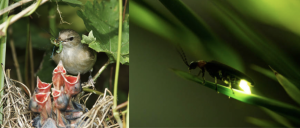

By: Jo Doumbia
Well February is gone, and we did not have a winter to really speak of; nevertheless, as we are entering March, our minds are focusing on Spring thoughts. Many of us are already dreaming of flowers, birds, gardens, and possibly getting seeds. Lovely time to tune our hearts and souls to nature. As many of us have experienced, our place in living nature is essential to our beings. To reconfirm, let’s just simply recreate the feelings we get when we enter mature grown forests.
To bring home this feeling, let’s create and/or cultivate our own solace green spaces, be it a backyard, a deck, a balcony, a container. Let’s enjoy that vibrant outside universe; a place, that as told by Nancy Lawson in her book Wildscape, many languages are spoken in multiple sensory alphabets that we humans have just begun to decipher. Even though we cannot capture the myriads of ultrasound clicks or ultraviolet colors or do not understand all those calls of alarm, distress, companionship or defense sounds without the help of a translator to decode, we keep enjoying nature.
While recognizing the numerous aspects that makes nature magic, we get inclined to acknowledge that these green spaces are not really ours but rather belonging to a great diverse number of communities with their own rules and systems. So, the choices we make when setting our green areas will almost determine the kind of interactions that will take place. For instance, for having lots of birds to delight us with their songs, they will need to have sufficient food to nourish their broods; for having sufficient protein food (i. e., caterpillars) there have to be sufficient native plants, so that the insects that have evolved with these plants will be plentiful. Lots of eggs will be lay and lots of insects will become available.
If in addition, if we want to set the stage for fireflies or lightning bugs be available for us to enjoy later on, we would consider setting secluded, moist, organically rich environments, we would set aside a portion of your land for a little bit of wilderness and allow a diverse mixture of native grasses and flowers to grow taller than the manicured lawn. We would also keep outdoor lights to a minimum to allow lightning bugs optimal communications with each other. No love language? No new lightning bugs. And of course, for the well-being of all creatures, would not apply pesticides. Let’s remember they are also declining along with insects and birds, among other creatures.